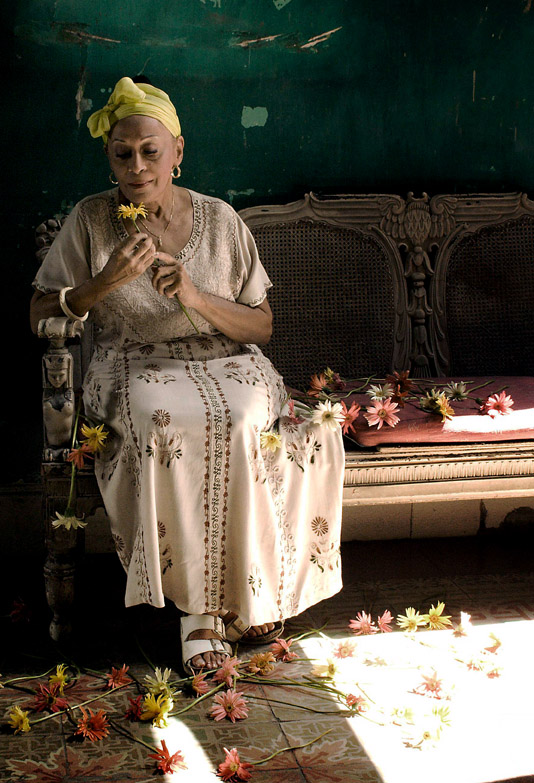While the United States continues to uphold a 47-year-long trade embargo with Cuba in one of the last residues of the Cold War, a classic Cuban singer is coming to Royce Hall and bringing a trade of musical roots and influences.
Omara Portuondo is one of the few traditional Cuban performers granted a visa to perform in the United States in recent years, making her an uncommon musical ambassador. Her U.S. tour coincides with a celebration of her 60th year as a professional performer. Portuondo’s career has included the famous Tropicana cabaret, Buena Vista Social Club, duets with singers such as Maria Bethania and numerous world tours.
“I don’t think there is a better representative of the traditional Cuban form of songwriting or a better singer-songwriter out there,” said Phil Rosenthal, UCLA Live director of marketing and communications. “She is really the queen of Caribbean folk art, … a legend in her own right.”
A traditional singer and songwriter, Portuondo became famous in the Cuban bolero genre, which is defined by slow-tempo dance music and a rumba rhythm. Her musical style draws from both Afro-Cuban and jazz influences ““ an impact definitive of not only Cuban music but also culture.
“From Spanish and African, our Cuban culture started,” Portuondo said through an interpreter. “Our culture fuses African and Spanish (roots).”
This underlying cultural fusion is evident in Portuondo’s music as well as other forms of popular Cuban music.
“Saying Afro-Cuban is like saying African-American,” said Nolan Warden, a graduate student in ethnomusicology. “There is no popular music in the U.S. that wasn’t influenced by or simply developed from African-American musical forms. The same goes for Cuba and Afro-Cuban music. (Portuondo) might not play Afro-Cuban music in the sense that the word often implies folkloric drumming, but all Cuban popular music is influenced by Afro-Cuban music.”
While Afro-Cuban elements appear in Portuondo’s music, jazz influences are perhaps even more prominent. Portuondo has performed along with her jazz accompaniment in numerous festivals, including the Japan Jazz Festival in 2002, accompanied by Michael Brecker and Herbie Hancock, among others.
“We are traveling with jazz musicians,” Portuondo said. “We have Cuban roots and also African roots, and all of these things we can explain to the young (student) audience.”
Portuondo will be performing songs from her recently released album “Gracias,” which showcases varied musical elements. The album is a celebration of Portuondo’s long musical career and features jazz-inspired “Nuestro Gran Amor” and “Drume Negrita,” as well as the rhythmic duet, “O Que Sera.”
“(On) this album I have bolero songs, songs of the 1930s, songs of Cuban songwriters, as well as Cuban country music,” Portuondo said.
Although the United States and Cuba have not had a positive relationship in the past, the universal appeal of Portuondo’s music was evidenced by a warm American audience reaction during her last U.S. tour in 2004.
“The American audience received (us) perfectly. The same thing happens in Europe and Australia,” Portuondo said.
Portuondo’s performance at Royce Hall is just one of the world-class shows put on at the UCLA campus. Artists such as the Kronos Quartet, Gal Costa, Ralph Stanley & His Clinch Mountain Boys and Cherryholmes have already performed here or are scheduled to go on stage in a showcase of world talent.
“We’re committed to bringing the finest in world music to Royce Hall. Specifically for Omara, we have a very long history of bringing all types of so-called “˜folk music’ to our stage,” Rosenthal said. “There are huge touring artists that have become regulars here in Royce Hall due to our programming.”
While famous musicians are not uncommon to the UCLA campus, Portuondo’s performance is uncommon and hopes to raise the profile of Cuban music in the region. Perhaps most notably through Portuondo’s music coming to Royce, a more positive international relationship between the United States and Cuba is being shown.
“The story here is that she is the first one in years to be granted a visa to perform in the United States. It is part of the Obama administration’s attempt in healing relations with Cuba and allowing these national treasures to play in the U.S.,” Rosenthal said. “We hope to bring more as attitudes change politically toward Cuba and U.S. relations overall. … We hope it is just the beginning.”
